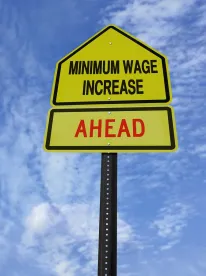On July 21, 2021, the Department of Labor issued a Notice of Proposed Rulemaking to implement President Biden’s Executive Order 14026 increasing the minimum wage for certain employees of federal government contractors and subcontractors to $15.00 per hour. As expected, the proposed regulations are generally consistent with the regulations previously issued by the Obama administration in 2014 to implement President Obama’s increase in the federal contractor minimum wage.
Under the proposed regulations, the minimum wage for workers performing services on or in connection with a federal contract will increase to $15.00 per hour as of January 22, 2022, with inflation-based adjustments on January 1 of 2023 and each successive year. The increased minimum wage applies to contracts that are entered, renewed, or extended (including extensions through the government’s exercise of an option) after January 30, 2022. The regulations provide contractors with a short grace period, however, as contracts entered into between January 30, 2022 and March 30, 2022 that result from pre-January 30, 2022 solicitations are not covered by the regulations until the contract is renewed or extended. The regulations include a minimum wage of $10.50 per hour for tipped employees, but the ability to take a tip credit will phase out on January 1, 2024, after which point tipped employees will be entitled to the same minimum wage as other covered employees.
Notable exclusions from the increased minimum wage include federal grants, contracts with Indian Tribes, procurement contracts excluded from the Davis-Bacon Act, service contracts excluded from the Service Contract Act, contracts that are not performed in the United States, and contracts for manufacturing or furnishing materials, supplies, articles, or equipment to the federal government.
As in the previous regulations, employees perform services “on” a federal contract when they directly perform the services called for by the contract, which should be a relatively straightforward determination. Employees perform services “in connection with” a federal contract when they perform services that are not required by the contract, but are necessary to the performance of the contract’s services. Common examples of services “in connection with” a contract include custodial, security, or maintenance services at facilities that perform work on federal contracts. Workers who only perform “in connection with” a federal contract are not subject to the minimum wage requirement if they perform less than 20% of their work time on performing services “in connection with” the contract. Both prime contractors and subcontractors of any tier are covered by the higher minimum wage.
The regulations do not create a private right of action for employees to sue contractors for unpaid wages, but instead provide for the Department of Labor’s Wage and Hour Division to investigate complaints of violations. Employers are prohibited from retaliating against employees who make such complaints. Possible sanctions for failing to pay the increased minimum wage include withholding of contract payments from the prime contractor, the termination of contracts, and debarment from federal contracting.




 />i
/>i

